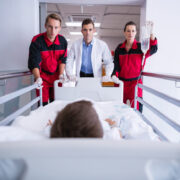
A lung cancer diagnosis can be a scary time. You may feel like you are all alone and have no idea what to do next. Support groups such as Hong Kong Cancer Fund come in handy.
What is a support group?
A support group is a group of people who meet up regularly to discuss problems or issues. Many support groups are for people with similar conditions, so topics revolve around the disease. In some cases, a support system can be a noble institution with a mission and vision to help people.
How can you get a support group?
There are many places to find a support group. Some of the most common include online forums, social media websites such as Facebook, and other organizations that offer different support types.
What factors should you consider when looking for a support group
Some of the factors that you should look for in a support group include the following:
- Find out what level of commitment is expected of members (such as mandatory attendance or phone calls between meetings). Some support groups are run by patients, while others are professional organizations that require more time and effort from you.
- Look at how active the group is. Some groups are very active, while others are not. If you are looking for support and feedback, make sure the group is active.
- Ask friends or family if they know of any good support groups for your specific disease. Word-of-mouth is often the best way to find something like this.
- If you are not comfortable meeting people in person, there are many online support groups you can join.
What are the benefits of joining a support group?
There are many benefits to joining a support group after a Hong Kong lung cancer screening and treatment.
The Benefits
- The ability to share your experiences with others who understand what you are going through.
- The ability to get the latest information and updates about a lung cancer diagnosis.
- Feelings of belonging and having a community that you can rely on for emotional support are beneficial if you do not have family or friends who understand what you are going through.
- In many cases, the group can offer practical support, such as help with transportation or finding a doctor.
- The ability to talk to someone who has been through what you are going through and get their advice.
- The ability to vent your frustrations and anger in a safe and supportive environment.
- The ability to find hope and inspiration from others who have dealt with what you face.
- The ability to share in the victories of others dealing with lung cancer can help give you hope that you will get through your diagnosis.
What are the stages of lung cancer?
Early Detection: This is when the tumor is still small and in the early stages of development. It may or may not have spread to other parts of the body yet.
Diagnosis: The doctor will confirm that you have cancer during this stage after doing tests such as CT scans or biopsies.
Staging: The next step is to find out how far cancer has spread, which determines your prognosis and treatment plan. It can be done by doing more tests like MRI or CT scans.
Treatment: Once your doctors know what type of lung cancer you have and how far it’s developed, they can begin to develop a treatment plan. It may include surgery, radiation therapy, or chemotherapy.
Follow-Up: Once your treatment is completed, you will need regular check-ups to prevent cancer recurrence. When you notice any reoccurrence early it will be a better option to start treatment fast.
Lung treatment
There are different modes of treatments, including:
- Surgery – This can be used to remove a part of the lung or, in some cases, the entire lung.
- Chemotherapy – This involves using medication to kill cancer cells.
- Radiation therapy – This uses high-energy beams to kill cancer cells.
- Targeted therapy is a newer form of treatment that targets specific genes or proteins that help cancer cells grow.
- Immunotherapy uses the body’s immune system to fight cancer cells.
- Hormone therapy uses hormones to stop cancer cells from growing.
What are the symptoms of lung cancer?
Symptoms of lung cancer include:
- A new cough that won’t go away
- Coughing up blood
- Coughing up blood or rust-colored phlegm.
- Shortness of breath, wheezing, and chest pain.
- A hoarse voice.
- Bone pain.
- Weight loss without trying.
Is there a self-test for lung cancer at home?
There is no self-test for lung cancer at home, and it is essential to remember that only a doctor can diagnose lung cancer. If you are experiencing any of the symptoms listed above, please see your doctor.
Can lung cancer be cured?
Lung cancer can often be cured if caught in the early stages. However, if it has already spread to other parts of the body, fixing it is not always possible.
What is the prognosis for lung cancer?
The prognosis for lung cancer varies depending on several factors, such as the stage of the disease and the type of lung cancer. However, in general, the earlier it is diagnosed, the more likely it will be treated successfully.
Can lung cancer affect children?
Lung cancer can also affect children. Smoking or exposure to second-hand smoke increases the risk of children developing lung cancer, regardless of their age.
Is lung cancer contagious?
Lung cancer is not contagious, and you cannot catch it from someone else.
Conclusion
Getting a support group is very helpful for many patients dealing with lung cancer. Support groups are available in many forms, including online, social media forums, or other organizations run by patients. You first need to book a Hong Kong lung cancer screening to know if you suffer from this disease. Once you have made a lung cancer diagnosis, it is beneficial to get started with a support group right away to help fight your condition.











